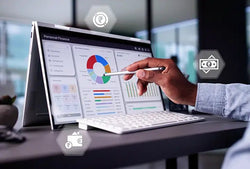When we talk about accounting, we mainly refer to financial accounting, which is compulsory for any business. But then there is cost accounting, which is extremely important for certain industries. As a business owner, you should know the difference between cost accounting and financial accounting, and whether both are applicable to your business.
While financial accounting provides a generalized view of a company’s income vs. expenditure, profit, debt, and performance, cost accounting is a specialized exercise that provides an in-depth and accurate view of the cost structure of a company’s products, services, and other activities.
Accurate cost accounting enables manufacturers to define price policies. Knowing your costs is a critical component of defining sales prices correctly. It helps manufacturers set reasonable pricing for their products while making an increased profit.
Understanding the distinction between cost accounting and financial accounting can help you make informed financial decisions, improve operational efficiency, and comply with regulatory requirements.
What is financial accounting?
Financial accounting is the process of recording, reporting, and summarizing financial transactions within a business entity over a given period of time. In other words, it is the accounting involved in recording an organization’s financial information in order to accurately portray the company’s financial position.
The main purpose of financial accounting is the preparation of financial statements for a particular accounting period for an entity in a specific manner. The financial statements include the Income Statement, the cash flow statement, and the balance sheet. These statements help to track an entity’s performance, profitability, and financial status over time.
With data from accurate financial accounting in hand, the management can take preventive action by identifying risk areas, such as cash flow problems or excessive debt. At the same time, it helps investors and shareholders assess the company’s financial and operational situation accurately and make informed decisions. Stakeholders may better plan and forecast, manage risks, and assess performance with the aid of financial accounting.
What is cost accounting?
Contrary to financial accounting, which primarily serves external stakeholders, cost accounting is mainly carried out for the internal control of business costs and operational budgeting, especially in manufacturing or service businesses. The identification, measurement, analysis, and distribution of costs related to manufacturing goods or rendering services are the main objectives of cost accounting.
In order to assist organizations in making wise decisions, managing expenses, and enhancing profitability, it entails monitoring and evaluating costs at every stage of the manufacturing process.
Cost accounting helps with pricing, budgeting, and performance reviews by offering useful information for managerial decision-making.
What information does cost accounting provide that financial accounting does not?
Both cost accounting and financial accounting offer important financial information to users, however, they focus on different areas of an organization's operations. Below are some of the types of information cost accounting can provide that financial accounting cannot:
Detailed cost information:
This type of information provides granular information about the cost of producing a particular product or service, or the cost of each department or activity in a company. This level of granularity is not provided by financial accounting, which typically provides more general financial information.
Efficiency analysis:
Cost accounting is able to identify inefficiencies in a company's production or service processes, which can lead to higher costs than expected. This level of operational detail cannot be provided by financial accounting.
Break-even analysis:
The data provided by cost accounting can help a company determine what level of sales they need to cover their costs. Financial accounting doesn’t give this kind of analysis.
Cost behavior analysis:
The historical data from cost accounting provides insight into how costs change over time as a function of business activity. It’s an important analysis that can help you make better decisions about your budget and forecasting.
Differences between Cost Accounting and Financial Accounting
|
Sl. No. |
Cost Accounting |
Financial Accounting |
|
1. |
Concentrates on the analysis and tracking of costs connected with the manufacturing process or specific activities within an organization. |
The focus is on an organization's total financial transactions, reporting, and performance. |
|
2. |
It provides comprehensive data on the manufacturing costs of a product, providing insight into the drivers of costs and cost control processes. |
It provides a holistic view of an organization’s financial position and performance, covering revenue, costs, assets and liabilities. |
|
3. |
Helps make pricing decisions, budgeting decisions, product mix decisions, and cost savings decisions. |
Helps make investment decisions, financial decisions, and determines the company's profitability and financial health. |
|
4. |
It involves the division of costs into products, departments or activities, and helps to determine the selling price and inventory value. |
It also involves preparing and presenting financial statements, including balance sheets, income statements and cash flow statements, for internal and external reporting. |
|
5. |
Impacts cost analysis with various cost drivers, including direct material costs, direct labor costs, overhead costs, etc. |
Ensures compliance with Accounting Standards, Regulations, and Financial Reporting Standards to ensure accurate and clear financial statements. |
|
6. |
It includes cost-allocation methods such as job-costing, process-costing, activity-costing, etc. |
Accrual accounting methods such as matching principle, financial ratio analysis, etc. are used to measure the profitability and financial performance of an organization. |
|
7. |
Provides information to internal stakeholders, including management and operating teams, for cost management, performance measurement and decision-making. |
Provides information to external stakeholders, including investors, lenders and regulators, for financial analysis, performance measurement and outlook. |
|
8. |
It focuses on the long-term aspects of cost analysis to help with planning, budgeting and forecasting. |
It focuses on the history of financial transactions to give a clear picture of the organization’s past performance and financial situation. |
|
9. |
Mainly used internally by management and employees within the organization to track expenses and enhance operational effectiveness. |
Mainly used by third parties, including investors, lenders, and regulators, to evaluate the financial health and performance of the organization. |
|
10. |
The various steps like tracking, analyzing, and reporting costs and performance metrics are done through cost accounting software and systems. |
GAAP (Generally Accepted Accounting Principles) or IFRS (International Financial Reporting Standards) is used to ensure consistent and comparable financial reporting. |
How do cost accounting and financial accounting affect your decision-making process?
Cost accounting gives you a 360-degree view of the costs of a particular activity, process, product, or service. This data can help you make decisions on a daily basis, such as how to allocate resources or optimize operations.
By contrast, financial accounting gives you a full picture of a company's financial health. This can help you decide where to invest your money, such as whether to open a new location, launch a new product, or buy another business. In addition, financial accounting can influence the decisions of external stakeholders, like investors or lenders. This can affect your ability to access capital.
GGC’s Practical Training Academy provides industry-oriented training modules on finance subjects. Join an online certification finance program on financial accounting and taxation to advance your finance career.



